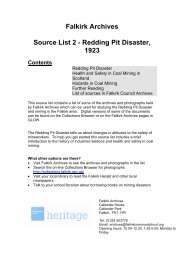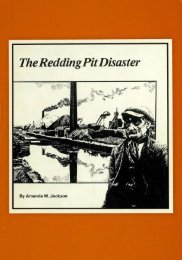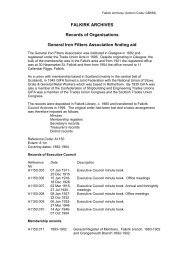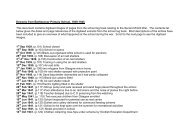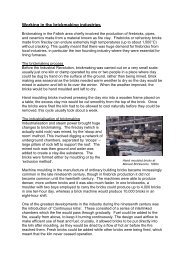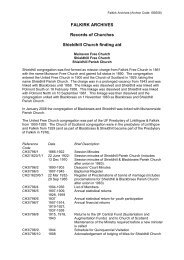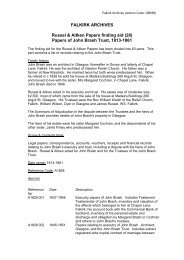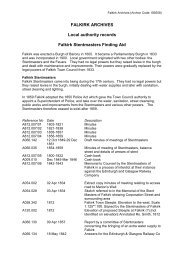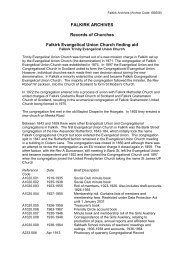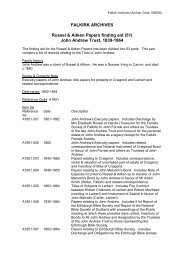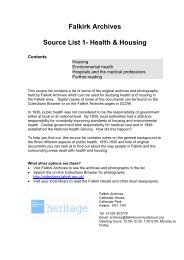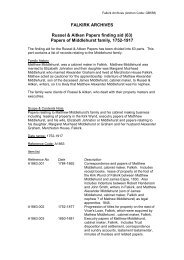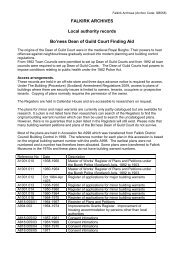Second World War source list - Falkirk Community Trust
Second World War source list - Falkirk Community Trust
Second World War source list - Falkirk Community Trust
Create successful ePaper yourself
Turn your PDF publications into a flip-book with our unique Google optimized e-Paper software.
<strong>Falkirk</strong> Archives<br />
Source List 3 - The <strong>Second</strong> <strong>World</strong> <strong>War</strong><br />
in <strong>Falkirk</strong> district<br />
Contents<br />
Introduction<br />
The Home Front<br />
Rationing<br />
National Registration<br />
Billeting Schemes and Evacuees<br />
Fund-raising<br />
Entertainment<br />
<strong>War</strong>time Work<br />
Victory celebrations<br />
Further reading<br />
This <strong>source</strong> <strong>list</strong> contains a <strong>list</strong> of some of the archives and photographs held<br />
by <strong>Falkirk</strong> Archives which can be used to find out what happened during the<br />
<strong>Second</strong> <strong>World</strong> <strong>War</strong> in the <strong>Falkirk</strong> area. Digital versions of some of the<br />
documents can be found on the Collections Browser, on the <strong>Falkirk</strong><br />
<strong>Community</strong> <strong>Trust</strong> website or on the <strong>Falkirk</strong> Archives pages in GLOW.<br />
The <strong>source</strong> <strong>list</strong> is divided into a number of topics. For each topic you will find<br />
a brief introduction to the topic and a <strong>list</strong> of some of the archives and<br />
photographs in <strong>Falkirk</strong> Archives.<br />
What other options are there?<br />
Visit <strong>Falkirk</strong> Archives to see the archives and photographs in the <strong>list</strong><br />
Look at digital copies of some photographs on the Collections Browser<br />
http://collections.falkirk.gov.uk/<br />
Visit your local library to read the <strong>Falkirk</strong> Herald and other local<br />
newspapers for the 1940s.<br />
<strong>Falkirk</strong> Archives<br />
Callendar House<br />
Callendar Park<br />
<strong>Falkirk</strong>, FK1 1YR<br />
Tel: 01324 503779<br />
Email: archives@falkirkcommunitytrust.org<br />
Opening hours: 10.00-12.30, 1,30-5.00; Monday to<br />
Friday
The Home Front<br />
The minutes of the town councils of <strong>Falkirk</strong>, Grangemouth, Denny &<br />
Dunipace and Bo’ness are amongst the best <strong>source</strong>s for information about<br />
what happened locally during the <strong>Second</strong> <strong>World</strong> <strong>War</strong>. In these you will find<br />
arguments about who should pay for the air raid shelters which local people<br />
were building, discussions about who was responsible for fires which crossed<br />
boundaries, where evacuees could be billeted, what fund-raising efforts could<br />
be encouraged and progress reports on wartime activities and arrangements.<br />
You will also find all the routine matters which Town Councils remained<br />
responsible for, even during wartime - renting and building houses, letting<br />
town halls, regulating shops and factories and caring for parks and<br />
cemeteries. By reading through these minutes, you can discover for yourself<br />
the changes people had to make to their lives because of the war, and you<br />
can see how people tried to get on with normal, everyday life despite the war.<br />
A818.001/49-55 1939-1946 Bo’ness Town Council minutes<br />
A814.001/20-24 1939-1946 Denny & Dunipace Town Council minutes<br />
A812.001/44-49 1939-1946 <strong>Falkirk</strong> Town Council minutes<br />
A816.001/43-49 1939-1945 Grangemouth Town Council minutes<br />
A066.073 (1939) <strong>War</strong> damage to property claim form<br />
A066.089 1939 Form (unused) for taking possessing land<br />
under Defence Regulations, 1939 by <strong>Falkirk</strong><br />
Town Clerk<br />
A066.090 1939 Unused form for possession of land or<br />
premises under the Defence (General)<br />
Regulations 1939<br />
A066.091 1939 Claim form for making good damage under<br />
the Compensation (Defence) Act, 1939,<br />
relating to compulsory possession of land or<br />
premises<br />
A066.116 1940 Notice concerning late opening hours of<br />
shops in <strong>Falkirk</strong><br />
A486.02 (c. 1946) Photocopy of economy label for envelope,<br />
Ministry of National Insurance, 26 East<br />
Bridge St, <strong>Falkirk</strong><br />
A753.002 1944 Christmas card to Mrs Alexander Bell, 51B<br />
Philpinstone Terr, Bo'ness, from Pte A Bell,<br />
General Hospital (annotated "from Italy")
Rationing<br />
Food, clothing, petrol and most other items had to be rationed from the early<br />
stages of the <strong>Second</strong> <strong>World</strong> <strong>War</strong>. Britain was cut off from its main suppliers<br />
by the submarine blockade around the shores. The Merchant Navy<br />
organised convoys. Neutral and friendly countries provided supplies to Britain<br />
on the promise of repayment after the war. The people of Britain had to<br />
economise as much as possible in order to survive. Rationing of personal<br />
items was only one way of coping. people were also encouraged to “Dig for<br />
Victory” by turning flower gardens into productive vegetable plots. Re-cycling<br />
and re-using goods was an important part of the war effort.<br />
You will find references to what happened locally in the local newspapers.<br />
The <strong>Falkirk</strong> Herald and other newspapers are available on microfilm in the<br />
libraries.<br />
A192.001/01 1953-1954 Food Ration Book of William Cockburn, 66 Main<br />
Street, Bainsford. Stamped by <strong>Falkirk</strong> & District<br />
United Co-op Society Ltd.<br />
A192.001/02 1953-1954 Food Ration Book of Catherine Cockburn, 66<br />
Main Street, Bainsford. Stamped by <strong>Falkirk</strong> &<br />
District United Co-op Society Ltd.<br />
A258.29/01 1947-1948 Clothing Ration Book<br />
A424.01/05 1953-1954 Ration book of Flora MacDonald of Ronaldshay<br />
Crescent, Grangemouth<br />
A431.003 1945-1946 Clothing ration book of N Roberton, 71 Dollar<br />
Ave, <strong>Falkirk</strong><br />
A466.01 (1940s) Motor fuel ration book (unused)<br />
A598.01 1953-1954 Ministry of Food ration book of Benjamin<br />
Aitchison,<br />
A598.02 1953-1954 Ministry of Food ration book of Mary G<br />
Aitchison, 104 Thornhill Road, <strong>Falkirk</strong><br />
A598.03 (c 1946) Ration Book Holder<br />
A738.007 1953-1954 Food ration book of Arthur McHugh, 15<br />
Lochhead Ave, Denny. Held in leather Ration<br />
Book Case<br />
A738.008 1953-1954 Food ration book of James McHugh, 15<br />
Lochhead Ave, Denny. Held in leather Ration<br />
Book Case<br />
A738.009 1953-1954 Food ration book of Mary McHugh, 15 Lochhead<br />
Ave, Denny. Held in leather Ration Book Case<br />
P22431 1940s Caravan with recycling advertising during<br />
<strong>Second</strong> <strong>World</strong> <strong>War</strong><br />
P22432 1940s Caravan with recycling advertising<br />
P22433 1940S Shop window display about recycling from<br />
domestic refuse during <strong>Second</strong> <strong>World</strong> <strong>War</strong><br />
P22448 1940s Recycling display on mock tank in Glasgow<br />
during the <strong>Second</strong> <strong>World</strong> <strong>War</strong><br />
P22496 1940s Group of 5 adults and 2 children on salvage<br />
drive during <strong>Second</strong> <strong>World</strong> <strong>War</strong>
National Registration<br />
In wartime, people were afraid of spies and invading forces. One way to<br />
counter this was the issue of identity cards to everyone who lived in Britain.<br />
This allowed the authorities to identify anyone who was a citizen of one of the<br />
enemy countries. Unfortunately, many innocent people were interned during<br />
the war, simply because they were citizens of an enemy country - Italians who<br />
had lived in Scotland for many years were interned. Some prominent<br />
conscientious objectors were also interned, because they were regarded as a<br />
threat to the war effort. Some Irish citizens were interned, although Ireland<br />
was neutral.<br />
Everyone was required to carry their identity card at all times. Even children<br />
had identity cards. In an area like Grangemouth where there were shipyards<br />
and significant munitions manufacturing, identity cards were very important.<br />
A192.002 1943 Identity Card of Catherine Cockburn, 79 Main<br />
Street, Bainsford<br />
A424.01/01 (1943-1946) National Registration Identity Card of Flora<br />
MacDonald, Carronflats Rd, Grangemouth<br />
A424.01/02 1948 National Identity Card of Robert M MacDonald,<br />
Carronflats Rd, Grangemouth<br />
A583.03 1946, 1949 National Registration Identity Card of Alastair<br />
C.B. Robb<br />
A583.04 1046-1949 National Registration Identity Card for Jean McC<br />
Robb<br />
A738.010 1940 Sep 9 National Registration Identity Card with<br />
endorsement (Police) of James McHugh, Police<br />
Officer, Denny<br />
A738.011 1943 National Registration Identity Card of Mary<br />
McHugh, Denny
Billeting Schemes<br />
Early on in the <strong>Second</strong> <strong>World</strong> <strong>War</strong>, people were given the chance to evacuate<br />
their children to safer parts of the country. many children did not travel very<br />
far: children from Clydebank were evacuated to Renton, near Glasgow, for<br />
example. Children from the Clydebank area and other more dangerous areas<br />
were also evacuated to the <strong>Falkirk</strong> area. Arrangements had to be made to<br />
accommodate these children. In most cases, evacuees were taken in<br />
voluntarily, but if there were not enough volunteers, then billeting became<br />
compulsory.<br />
Essential workers were also billeted on local families. Nurses, doctors, fire<br />
officers and Air Raid Precautions officers were all considered essential, and if<br />
they came from other parts of the country they were often billeted on local<br />
families who had a spare room or who could make space for someone else.<br />
Billeting was organised by the local authorities - usually the town clerks and<br />
their staff.<br />
A066.081 (1941) Forms and instructions relating to billeting of<br />
children during the <strong>Second</strong> <strong>World</strong> <strong>War</strong> (unused)<br />
A474.001 c. 1940 Billeting Scheme. Note of available surplus<br />
accommodation in the neighbourhood of <strong>Falkirk</strong><br />
High School. Contains <strong>list</strong> of addresses,<br />
householder's name and number of rooms available<br />
A474.002 c. 1940 Billeting Scheme. Note of available surplus<br />
accommodation in the neighbourhood of Carmuirs<br />
School. Contains <strong>list</strong> of addresses, householder's<br />
name and number of rooms available<br />
A474.003 c. 1940 Billeting Scheme. Note of available surplus<br />
accommodation in the neighbourhood of Camelon<br />
School. Contains <strong>list</strong> of addresses, householder's<br />
name and number of rooms available<br />
A474.004 c. 1940 Billeting Scheme. Note of available surplus<br />
accommodation in the neighbourhood of St. Francis<br />
School. Contains <strong>list</strong> of addresses, householder's<br />
name and number of rooms available<br />
A474.005 c. 1940 Billeting Scheme. Note of available surplus<br />
accommodation in the neighbourhood of Meeks<br />
Road School. Contains <strong>list</strong> of addresses,<br />
householder's name and number of rooms available<br />
A474.006 c. 1940 Billeting Scheme. Note of available surplus<br />
accommodation in the neighbourhood of Victoria<br />
School. Contains <strong>list</strong> of addresses, householder's<br />
name and number of rooms available<br />
A474.007 c. 1940 Billeting Scheme. Note of available surplus<br />
accommodation in the neighbourhood of Northern<br />
School. Contains <strong>list</strong> of addresses, householder's<br />
name and number of rooms available<br />
A474.008 c. 1940 Billeting Scheme. Note of available surplus<br />
accommodation in the neighbourhood of Bainsford<br />
School. Contains <strong>list</strong> of addresses, householder's<br />
name and number of rooms available<br />
A474.009 1938 A.R.P Evacuation correspondence file. Contains
circular letters from Department of Health for<br />
Scotland to local authorities with instructions on the<br />
evacuation schemes<br />
A474.010 1939-1942 Billeting of persons rendered homeless.<br />
Correspondence file. Contains scheme of<br />
arrangements for billeting in <strong>Falkirk</strong>, with <strong>list</strong>s of<br />
billeting officers, rest centres, instructions for an<br />
Emergency Relief exercise in <strong>Falkirk</strong>, 1941, training<br />
material and official forms<br />
A474.011 1944 Hillside - requisitioning for billeting under<br />
Government Evacuation scheme. Correspondence<br />
file.<br />
A474.012 1940-1042 Correspondence file relating to emergency billeting<br />
of nursing and medical staff for <strong>Falkirk</strong> & District<br />
Royal Infirmary and notices to evacuated persons,<br />
government circulars to local authorities, and other<br />
papers<br />
A474.013 1939-1946 Correspondence, government circulars and notes<br />
relating to billeting scheme in <strong>Falkirk</strong> and recovery<br />
of cost of billeting individuals<br />
A474.014 1940-1945 Correspondence relating to billeting of individuals in<br />
<strong>Falkirk</strong><br />
A474.015 1944-1945 Correspondence relating to billeting of individuals in<br />
<strong>Falkirk</strong> and return of individuals to home areas, with<br />
<strong>list</strong>s of unaccompanied children<br />
A474.016 1940-1942 Sample blank forms relating to billeting scheme.<br />
Includes notice of claim for compensation following<br />
requisition of property, notices to owner and<br />
occupier on requisition of property, scheme of<br />
arrangements for billeting of persons rendered<br />
homeless resulting from enemy action, billeting<br />
guide and government circulars Also includes<br />
signed notice appointing Robert Lyle, Town Clerk,<br />
as Billeting Officer for <strong>Falkirk</strong> Burgh
Fund-raising<br />
The government encouraged local fund-raising to support the Forces and the<br />
cost of producing munitions, tanks, planes and ships. Local areas “adopted”<br />
ships or planes while local people held concerts, bazaars and rallies to raise<br />
money for the Red Cross parcels to prisoners or funds for different fighting<br />
campaigns or regiments. Fund-raising was important to keep the war effort<br />
going, but it also gave people at home the chance to participate and it<br />
boosted their morale.<br />
A076.010 1943 Poster advertising Christmas Sale in aid of Red<br />
Cross Funds<br />
A076.011 1943 Mar 20 Poster advertising Castlerankine Camp dance in<br />
aid of China Fund in Drill Hall, Denny<br />
A163.001 1940s Photocopy of directory "The County of Stirling -<br />
for the services". Includes adverts, <strong>list</strong>s of<br />
football fixtures, information on sports clubs,<br />
libraries, post offices, Ministry of Food office, and<br />
historical sketches of Stirlingshire and notable<br />
features<br />
A240.008 1940 Nov 1 Programme : The Spitfire Fund concert at <strong>Falkirk</strong><br />
Town Hall, with Sir Harry Lauder<br />
A319.002 (1942) Pamphlet "51st Highland Division in North Africa<br />
and Sicily" printed in aid of the 51st Highland<br />
Division <strong>Trust</strong> Fund<br />
P11420 c. 1940 People at Fund-raising Event<br />
Photographer : Telfer Drummond
Entertainment during the <strong>Second</strong> <strong>World</strong> <strong>War</strong><br />
Despite the war, life went on for most. People still went to school, grew up,<br />
got married, had children, became ill, died of natural causes, and took part all<br />
the normal activities of life. Young people in particular needed things to do,<br />
despite the black-out. Dances were very popular, especially as there were<br />
camps of soldiers in training nearby. The cinema was another important<br />
<strong>source</strong> of information and entertainment. Older people continued to run<br />
weekly social events in their social or work clubs. A paper shortage limited<br />
the size of magazines and newspapers, but these were still published<br />
because they helped to boost morale.<br />
A076.009 1943 Oct 20 Poster advertising “A” Coy. Home Guard dancing<br />
in Drill Hall, Denny<br />
A076.012 1943 Poster advertising Firemen's Social Club weekly<br />
whist drive in club rooms<br />
<strong>War</strong>-time magazines<br />
A306.01/01 Jun 1943 "Woman's Magazine",<br />
A306.01/02 Nov 1943 "Woman's Magazine",<br />
A306.01/03 Jan 1944 “Woman's Magazine"<br />
A306.01/04 Aug 1945 "Woman's Magazine"<br />
A306.01/06 Jul 1942 "Woman's Magazine" ,<br />
A306.02 (1940s) "London Opinion and the Humorist",<br />
A306.05 > Jun 1940 "Good Housekeeping"<br />
A212.001 1941-1944 The <strong>War</strong> Illustrated<br />
A416.001 1945 Jul "The Prisoner of <strong>War</strong>" the official journal of the<br />
prisoner of war department of the Red Cross and<br />
St John's war organisation (final issue)
<strong>War</strong>time Work<br />
Lots of people did different work in wartime from the work they would have<br />
done in peacetime. Women took over jobs left vacant by men who had been<br />
called up - working in shops, offices, factories and on the land. Women also<br />
joined the forces, acting as telephone and radio operators, clerical assistants<br />
and taking on other support roles. Men in essential work were exempt from<br />
being called up. Work was regulated by law, and workers gained better<br />
conditions during the war as a result.<br />
A349.01/01 1944 May 27 Notice of discharge from employment issued to<br />
Margaret Torrance , process worker, under<br />
National Service regulations<br />
A349.01/02 1944 May 27 Notice giving permission to Margaret Torrance<br />
to leave employment as process worker.<br />
Annotated on back - left to become nurse.<br />
A365.02 1942 Membership card of Marion Cullen, City and<br />
Royal Burgh of Edinburgh Fire Guard<br />
A521.003 1941 Sep 23 <strong>War</strong>rant of appointment of Robert Meek<br />
MacDonald as temporary Lieutenant in the<br />
Royal Navy Reserve. HMS Spartiate<br />
A761.001 1946 Soldier's Release Book Class "A" of Private<br />
John Louden<br />
A761.002 1940s Army Identity Card of John Louden, attached to<br />
the Medical Services<br />
A287.01 1944-1946 Soldier's Service and Pay Book<br />
P17927 1939-1940 Airport Workers<br />
P17928 1939-1940 Airport Workers<br />
P19486 1940s Female munitions workers at Carron Iron<br />
Works in <strong>Second</strong> <strong>World</strong> <strong>War</strong><br />
P19487 1940s Female munitions workers at Carron Iron<br />
Works in <strong>Second</strong> <strong>World</strong><br />
P20259 1944, Dec New Year Card from Henry Russell Ltd to<br />
employees in the Forces<br />
P25977 1940s Woman working at Carron Iron Works<br />
A220.003 1945 Oct Leaflet "Carron in <strong>War</strong>time" Contains<br />
description of wartime work, including<br />
munitions, heating and cooking equipment,<br />
tank track links, roller shackles, engine<br />
forgings and other equipment. Mentions SS<br />
Forth
Civil Defence and Air Raid Precautions in the <strong>Second</strong> <strong>World</strong> <strong>War</strong><br />
Fire officers, ARP wardens and the Home Guard were made up of volunteers.<br />
The volunteers included men in exempt occupations, men who were too old<br />
and boys who were too young for the regular forces and men who were<br />
conscientious objectors. These were potentially very dangerous noncombatant<br />
jobs. When the big cities were being bombed during the Blitz,<br />
many civil defence volunteers were killed while fighting fires or rescuing<br />
trapped people from bombed buildings.<br />
A332.01 nd <strong>Falkirk</strong> Iron Co. Directions for use of the "Vitair"<br />
general service respirator (gas mask) (See<br />
gas mask 1983-41-10)<br />
A332.02 (1940s) <strong>Falkirk</strong> Iron Co. Instruction leaflet for the<br />
National Eye Protector<br />
A332.04 (1940s) <strong>Falkirk</strong> Iron Co. Pamphlet "The Fire Guard's<br />
Pocket Chart"<br />
A337.04 1944 Notice : devolution of A.R.P. control to Burgh of<br />
<strong>Falkirk</strong><br />
A686.018 1940-1942 Correspondence, A Trotter, Superintendent,<br />
Office of Docks & Traffic, Grangemouth Docks<br />
with <strong>War</strong> Office, regarding defence regulations<br />
A760.001 1940s Stirling & Clackmannan A.R.P. Joint Authority<br />
Blank form: A R P Training <strong>War</strong>dens' Sector<br />
Diary<br />
P14887 1943 2nd Stirlingshire Home Guard, Shieldhill<br />
Platoon<br />
P17339 1941 Home Guard<br />
P19530 1941 Jul 20 <strong>Falkirk</strong> Home Guard on Callendar Estate<br />
Photographer : A A Dickson<br />
P19608 1940 Soldiers Photographer : <strong>Falkirk</strong> Herald<br />
P19671 1940s ARP warden group<br />
P19726 1940s 2nd Stirlingshire Battalion Home Guard "A"<br />
Company<br />
P20889 1940s Home Guard marching along Lumley Street,<br />
Grangemouth<br />
P23220 1939 Aug Platoon of territorials in the Argyll and<br />
Sutherlands, at Grangemouth Dock<br />
P25326 1940s Group of ARP wardens in Camelon Town Hall<br />
P26002 1940s Slamannan Home Guard - group photograph<br />
P26005 Home Guard Insignia - Local Defence<br />
Volunteers (LDV)armband<br />
P26006 Home Guard insignia, with words 'Home Guard'<br />
P26007 Home Guard insignia - four stripes<br />
P26017 c 1942 Miss Janet Miller in her ARP uniform,<br />
ambulance section<br />
P26032 1942-1943 Grangemouth Army Cadet Force outside<br />
Grangemouth Parish Church<br />
P26043 c. 1942 Miss Janet Miller in her ARP uniform,<br />
ambulance section, with her brother Alexander,<br />
a radio mechanic in the Fleet Air Arm
Victory Celebrations<br />
After the war, communities across Scotland found ways to recognise the<br />
sacrifices of the men and women in the Forces. The war memorials were, of<br />
course, an obvious way to mark those who did not return. A printed Roll of<br />
Honour in Bo’ness <strong>list</strong>ed both the dead and the survivors. Welcome Home<br />
Committees were set up in many local areas and various functions were held<br />
to celebrate their homecoming. In <strong>Falkirk</strong>, the first group who were<br />
demobilised were treated to tea at Matheson’s. However, Matheson’s was<br />
destroyed by a fire shortly after this, and all the remaining demobbed soldiers<br />
were sent a card and £1.00 instead.<br />
A066.133 1945 Tags: <strong>Falkirk</strong> Burgh Victory Celebrations -<br />
Member of Committee<br />
A258.25 1945 Order of service: <strong>Second</strong> Army Thanksgiving<br />
Service on conclusion of the campaign in North<br />
West Europe<br />
A486.01 1946 Mar 4 Photocopy of invitation to reception given by<br />
Burgh of <strong>Falkirk</strong> Welcome Home and<br />
Commemoration Fund<br />
A761.003 1946 Apr 3 Programme for reception and welcome home in<br />
West Church Hall, <strong>Falkirk</strong> (following end of<br />
<strong>Second</strong> <strong>World</strong> <strong>War</strong>)<br />
A669.001 1946 Welcome Home Card issued by Burgh of<br />
<strong>Falkirk</strong> to returning demobilised members of<br />
the armed forces<br />
A985.001 1946 Jun 8 Denny & Dunipace Burgh Souvenir<br />
programme for Victory Celebrations. Includes<br />
Children's Gala Day, dancing and fireworks<br />
A542.01 1945 Photocopy of certificate "The citizens of<br />
Bonnybridge and District welcome you home"<br />
issued to John Reid<br />
A669.002 1946 Card issued to members of the Rhine Army on<br />
demobilisation<br />
A618.001 1939-1945 Bo'ness and Carriden Parishes Roll of Honour<br />
<strong>World</strong> <strong>War</strong> 1939-1945. Also includes<br />
Blackness and District Roll of Honour<br />
P16627 1945 Photograph of street decorations<br />
P25245 c 1945 Grave of Flying Office R Moyes in Grandsable<br />
Cemetery, Polmont
Further Reading<br />
<strong>Falkirk</strong> Local History Society Calatria. Vol 10. The Journal Of The <strong>Falkirk</strong><br />
Local History Society. Includes article : <strong>Falkirk</strong> At <strong>War</strong> 1939-45<br />
Winter 1996<br />
Geoff Bailey Hard as nails (the Home Guard in <strong>Falkirk</strong> district), 2008




